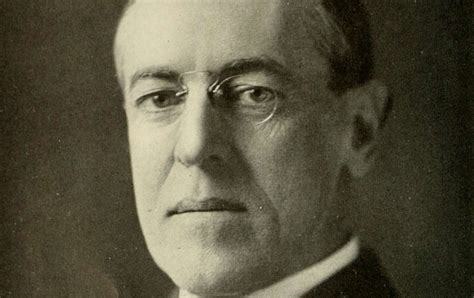Stuart Jeanne Bramhall's Blog: The Most Revolutionary Act , page 677
August 24, 2021
Hidden History: A Close Examination of Woodrow Wilson’s Legacy

The Skeptics Guide to American History
Episode 15 Woodrow Wilson and Rating Presidents
Mark Stoler PhD (2012)
Film Review
I confess Woodrow Wilson is one of my least favorite presidents. In addition to breaking his campaign promise to keep the US out of World War I, he is responsible for creating the Federal Reserve and the US income tax and invading the Soviet Union without a congressional declaration of war. In addition to breaking a second campaign promise to break up the big US trusts (“corporate monopolies”), he also opposed women’s suffrage and enacted policies that increased racial segregation. And while he claimed to be anti-imperialist, he launched more military interventions in Latin America than any other president in history.
Finally in addition to outlawing dissent through the Espionage and Sedition Act (the law under which Julian Assange has been indicted), he was responsible for the illegal Palmer raids involving the arrest, deportation and imprisonment of both immigrants and US citizens campaigning for greater social justice.
According to Stoler, Democratic President Woodrow Wilson only received 42% of the popular vote in 1912 when he was first elected. Because the popular vote was split three ways, owing to Teddy Roosevelt’s nomination by the Bull Moose Party, Wilson won the electoral college vote.
Wilson won his second term outright by promising to keep the US out of World War I. Stoler blames the 1917 US declaration of war on Wilson’s secretary of state William Jennings Bryan. Historian Alison Weir tells a much different story, blaming US involvement in the war on on secret dealings US Zionists and the British government which was suffering major casualties.*
After siding with Wilson’s critics on most of the above issues (he views the creation of the Federal Reserve and income tax** as positive achievements) Stoler goes on to enumerate Wilson’s “positive” accomplishments. These include the Federal Farm Loan Act and the Warehouse Act (to help struggling farmers), the Highway Act (to construct rural roads), the Owen-Keating Act (preventing Interstate shipment of items made with children labor), the Adamson Act (establishing the eight-hour day, but only for railroad workers) and the Kern-McGillicuddy Act (establishing a workers compensation scheme for federal workers).
*According to Weir, the secretive but powerful Zionist lobby Parushim (run by Wilson’s close friend Supreme Court chief justice Louis Brandeis), promised US entry into the war in return for Britain’s 1917 Balfour Declaration. The latter assured British support for a Jewish state in Palestine. (At the end of the war, control of Palestine would pass from the Ottoman Empire to Britain). See https://ifamericansknew.org/us_ints/history.html and https://stuartbramhall.wordpress.com/2021/07/16/the-hidden-history-of-the-balfour-declaration-and-the-state-of-israel/
**While I would agree that wealthy Americans should contribute more to running the government, a tax on labor, like the income tax, tends to tax the middle class more than the wealthy. In my view, a land value tax is far fairer. See https://stuartbramhall.wordpress.com/2013/12/24/progress-and-poverty-a-suppressed-economics-classic/
August 23, 2021
FDA Grants Full Approval of Pfizer Vaccine, Critics Blast Agency for Lack of Data, Scientific Debate
 By Megan Redshaw
By Megan Redshaw Critics said it was concerning that full approval was based on only six months’ worth of data — despite clinical trials designed for two years — and that there was no public discussion of the data.
The U.S. Food and Drug Administration (FDA) today granted full approval to the Pfizer/BioNTech COVID vaccine for people 16 years and older — without allowing public discussion or holding a formal advisory committee meeting to discuss data.This is the first COVID vaccine approved by the FDA, and is expected to open the door to more vaccine mandates by employers and universities.
The approval of Pfizer’s COVID vaccine was based on its clinical trial of 44,000 people — half of whom got the shots, the company said. The median six-month follow-up period for safety and efficacy began after participants received their second dose, Pfizer said.
[…]
Pfizer’s COVID vaccine received EUA on Dec. 11, 2020, for use in individuals 16 years and older. On May 10, the authorization was expanded to include 12- through 15-year-olds.
Pfizer’s vaccine will remain under EUA for 12- through 15-year-olds, and for a third dose in certain immunocompromised individuals.
[…]
Data released Friday by the Centers for Disease Control and Prevention (CDC) showed that between Dec. 14, 2020 and Aug. 13, 2021, a total of 326,535 adverse events had been reported to the Vaccine Adverse Events Reporting System (VAERS) attributed to Pfizer’s COVID vaccine, including 9,027 deaths and 56,607 serious injuries.
Critics accuse FDA of ‘unprecedented, naked power grab’
According to an article published Aug. 20 in the BMJ, transparency advocates have criticized the FDA decision not to hold a formal advisory committee meeting to discuss Pfizer’s application for full approval — an important mechanism used to scrutinize data.
Last year the FDA said it was “committed to use an advisory committee composed of independent experts to ensure deliberations about authorisation or licensure are transparent for the public.”
[…]
Kim Witczak, a drug safety advocate who serves as a consumer representative on the FDA’s Psychopharmacologic Drugs Advisory Committee, said the decision removed an important mechanism for scrutinizing the data.
“These public meetings are imperative in building trust and confidence especially when the vaccines came to market at lightning speed under emergency use authorization,” said Witczak. Wticzak was one of 27 experts who launched a citizen’s petition demanding the FDA “slow down and get the science right” before approving COVID vaccines.
“The public deserves a transparent process, especially as the call for boosters and mandates are rapidly increasing,” Wticzak said. “These meetings offer a platform where questions can be raised, problems tackled and data scrutinised in advance of an approval.”
Witczak said it’s concerning that full approval is based on only six months’ worth of data — despite clinical trials designed for two years — and there’s no control group after Pfizer offered the product to placebo participants before the trials were completed.
“They know they can’t win this argument on the science and that’s why they had to abolish the public process and independent oversight,” said Children’s Health Defense Chairman Robert F. Kennedy Jr. “They believe themselves so powerful now that they are stripping off all pretenses that this is about public health, and are baldly revealing the corruption.”
Kennedy told The Defender:
“This is a sinister scheme for mandating a badly flawed vaccine that has already made history with record deaths and injuries, that neither prevents disease nor transmission, and does not improve mortality. Pfizer’s most recent six-month data show that while the jab prevents some COVID deaths, it causes more heart attacks yielding a net loss of life.”
Diana Zuckerman, president of the National Center for Health Research, told The BMJ it’s obvious the FDA has no intention of hearing anyone else’s opinion, and says making decisions behind closed doors can feed vaccine hesitancy.
“It’s important to have a public discussion about what kind of data are there, and what the limitations are,” Zuckerman said.
[…]
Via https://childrenshealthdefense.org/defender/fda-full-approval-pfizer-vaccine-lack-scientific-debate/
Study: Fully Vaccinated Healthcare Workers Carry 251 Times Viral Load, Pose Threat to Unvaccinated Patients, Co-Workers
 By Peter A. McCullough, M.D., MPH
By Peter A. McCullough, M.D., MPH
A preprint paper by the prestigious Oxford University Clinical Research Group, published Aug. 10 in The Lancet, found vaccinated individuals carry 251 times the load of COVID-19 viruses in their nostrils compared to the unvaccinated.
A groundbreaking preprint paper by the prestigious Oxford University Clinical Research Group, published Aug. 10 in The Lancet, includes alarming findings devastating to the COVID vaccine rollout.The study found vaccinated individuals carry 251 times the load of COVID-19 viruses in their nostrils compared to the unvaccinated.
While moderating the symptoms of infection, the jab allows vaccinated individuals to carry unusually high viral loads without becoming ill at first, potentially transforming them into presymptomatic superspreaders.
This phenomenon may be the source of the shocking post-vaccination surges in heavily vaccinated populations globally.
The paper’s authors, Chau et al, demonstrated widespread vaccine failure and transmission under tightly controlled circumstances in a hospital lockdown in Ho Chi Minh City, Viet Nam.
ORDER TODAY: Robert F. Kennedy, Jr.’s New Book — ‘The Real Anthony Fauci’The scientists studied healthcare workers who were unable to leave the hospital for two weeks. The data showed that fully vaccinated workers — about two months after injection with the Oxford/AstraZeneca COVID-19 vaccine (AZD1222) — acquired, carried and presumably transmitted the Delta variant to their vaccinated colleagues.
They almost certainly also passed the Delta infection to susceptible unvaccinated people, including their patients. Sequencing of strains confirmed the workers transmitted SARS-CoV-2 to one another.
This is consistent with the observations in the U.S. from Farinholt and colleagues, and congruent with comments by the director of the Centers for Disease Control and Prevention conceding COVID-19 vaccines have failed to stop transmission of SARS-CoV-2.
On Feb. 11, the World Health Organization indicated the AZD1222 vaccine efficacy of 63.09% against the development of symptomatic SARS-CoV-2 infection. The conclusions of the Chau paper support the warnings by leading medical experts that the partial, non-sterilizing immunity from the three notoriously “leaky” COVID-19 vaccines allow carriage of 251 times the viral load of SARS-CoV-2 as compared to samples from the pre-vaccination era in 2020.
Thus, we have a key piece to the puzzle explaining why the Delta outbreak is so formidable — fully vaccinated are participating as COVID-19 patients and acting as powerful Typhoid Mary-style super-spreaders of the infection.
Vaccinated individuals are blasting out concentrated viral explosions into their communities and fueling new COVID surges. Vaccinated healthcare workers are almost certainly infecting their coworkers and patients, causing horrendous collateral damage.
Continued vaccination will only make this problem worse, particularly among frontline doctors and nurses workers who are caring for vulnerable patients.
Health systems should drop vaccine mandates immediately, take stock of COVID-19 recovered workers who are robustly immune to Delta and consider the ramifications of their current vaccinated healthcare workers as potential threats to high risk patients and coworkers.
[…]
Australia going full Fascist – but resistance growing
Kit Knightly
OffGuardian
The Australian government been leading the pack on Covid-based tyranny from the beginning, but are they pushing their citizens to breaking point?Covid19 has been used as an excuse to increase government control of pretty much everything, pretty much everywhere.
It is, without question, the greatest campaign to seize power, and greatest assault on personal freedom, of my lifetime. With countries seemingly in a contest to outdo each other’s clampdowns, lockdowns, quarantines and surveillance programs.
From the beginning of the “pandemic” three countries, in particular, have set the pace on this – Canada, Australia and New Zealand. Since last spring these three have been one-upping each other in a race to the fascist finish line. And right now, Australia is putting a sprint in to pull away from the pack.
Cities are going into full lockdown for just one positive test. Some Australian cities and states aren’t just under total lockdowns, but also ever-extending curfews. The details of which read like a dystopian novel.
People are not permitted to leave the state, let alone the country. They’re not even permitted more than 5km (~3 miles) from their home. They’re not allowed out at all after 9pm or before 5am. Masks are mandatory everywhere for everyone. Outdoors and in. No religious services. No weddings. Shoot stray dogs, just in case.
Police barge into “unapproved” shops and fine business owners, or go house-to-house making sure no one has gone out. People who test positive are taken from homes for “indefinite stays” at “quarantine hotels”.
They are herding thousands upon thousands of children in stadiums, without their parents, to perform (allegedly) voluntary mass vaccinations, despite the possible dangers. The army has been deployed to check papers and vaccine status at road checkpoints.
The homes of those “self-isolating” are having government notices nailed to the doors. “Unauthorised protests” are banned, and if organize one you get 8 months in prison.
The unvaccinated are told they mustn’t leave their homes
[…]
And the nation’s billionaire-owned propaganda channels pump out this hysterical fear-mongering
Increasingly their rules and limitations are becoming not just tyrannical but literally insane. It seems, just about every day, one or another Australian politician or health “expert” is on the news saying something crazy.
Don’t take your masks off to drink. Don’t be friendly. Don’t watch the sunset. Tape your balcony shut. Don’t go out to shop, and don’t order online either
[…]
Via https://off-guardian.org/2021/08/23/australia-is-going-full-fascist-but-resistance-is-growing/
Prisoners to plug worker shortage in meat industry
The Covid pandemic and Brexit have both contributed to current worker shortages, with furloughed workers finding new jobs and EU nationals returning to their home countries.
https://www.bbc.com/news/business-58303679
ADVERTISEMENT https://9b58d0ac8b249391a485f5010ec36b80.safeframe.googlesyndication.com/safeframe/1-0-38/html/container.html
By Michael Race
Business Reporter, BBC NewsPublished5 hours agocommentsCommentsShareRelated Topics

Abattoirs, butchers and meat processors are set to employ prisoners and ex-inmates to help plug labour shortages.
Meat industry leaders held talks with the government on Monday to discuss options of how businesses could link up with prisons to fill vacancies.
The Association of Independent Meat Suppliers told the BBC the industry had about 14,000 job vacancies currently.
It said Covid, Brexit and perceptions over career paths had caused a looming “recruitment crisis”.
The industry body said businesses would seek to link up with prisons that contain prisoners who are part of the Release On Temporary Licence (ROTL) programme.
ROTL is a risk-assessed temporary release programme that inmates in open prisons use to gain work experience to help them in their transition back into the community.
Tony Goodger, of the Association of Independent…
View original post 420 more words
Large-scale Canadian protests against mandatory vaccine passports – media blacks it out

Monday, August 23, 2021 by: JD Heyes
(Natural News) Most Americans think of our neighbors to the north as a mostly benevolent people not prone to excitability or bucking authority, but all of that is changing in the age of COVID-19.
The most recent evidence is trickling out on various social media platforms: Video and photographs of massive protests against the increasingly authoritarian mandates imposed on Canadians by their elected leaders, to include mandatory vaccine passports and other documentation showing they have gotten a COVID-19 vaccine, lest they be barred from being full participants in their own country.
[…]
August 22, 2021
The Pandemic Response as Contemporary Imperialism

August 22, 2021: Police fire rubber bullets at protesters near Victoria Market. Sydney, Australia
By Addison Reeves
Left Lockdown Sceptics via Wrong Kind of Green
The almost uniform support for totalitarian lock-down measures and mandates from those on the left has been shocking to see and has resulted in a feeling of political homelessness for those whose leftist values are what lead them to view the response to the pandemic with a sharp critical eye. This article shows that the reason why so many on the left have abandoned the values of freedom of speech and movement, bodily autonomy, and economic justice is because those people belong to the ideology of progressivism, which exists outside the left-right dichotomy.
Progressivism is an ideology that champions limitless growth, unbridled use of technology and the control of nature over any intrinsic sense of worth or fulfillment. We all get dragged along on the march of ‘progress’ because progressives assume any deviance from their values is inferior and because they tend to control the world’s resources. Progress under this model is linear; the future is always an improvement on the past, and any attempt to resist change or divert course is seen as regressive and unscientific.
Progressives often engage in leftist rhetoric, but their proposals always result in strengthening and expanding the existing, inequitable system and further entrenching the current, elite class. Progressives propose superficial policies rather than measures that would truly allow citizens to become more self-sufficient or otherwise reduce inequality because that would undermine their primary goal of unlimited growth. That is why progressives increasingly take refuge in identity politics; it allows them to talk about changing the system without actually having to challenge the exploitative aspects of society that they rely on for profit and growth. They then blame the increasing disparities on their opponents for resisting ‘progress’.
Progressivism is the direct descendant of the imperialism that dominated much of Western history for centuries. While the common narrative of modern history would have us believe that imperialism faded away in the 20th century as military aggression was replaced with international, economic cooperation and democratic revolutions, imperialism never died. In the United States and other countries there has always been a championing of Enlightenment ideals of liberty and equality alongside the denial of these same values to other groups who were conquered, exploited, or oppressed for imperialist goals of expansion and profit. The legacy of imperialism is just as deeply imprinted on the minds of Americans as liberalism is.
Progressivism = imperialism
Imperialism is the practice of one group of people forcibly subjecting other groups of people to its authority and control for its own benefit, though the imperialists often rationalize their actions as an attempt to save or improve its victims. The history of imperialism in the United States has lent certain traits to its successor progressivism: an extractive belief system, an antipathy towards the natural world, a rigidly prescriptive mindset, and a pathological feeling of supremacy.
Progressivism, like imperialism, is built on the depletion of natural resources, with little concern for sustainability. This attitude extends not just to the plants, animals, and minerals we consume, but to humans (‘human resources’ or ‘human capital’) as well. Thus, the extractive belief system is evident in the slave and sweatshop labor that has and continues to subsidize the economy as well as the rapacious attitude towards nature. As an acquisition-focused philosophy, progressivism treats humans as objects to be possessed and controlled, especially for financial profit. Progressives show no qualms about manipulating people or depriving them of freedom or livelihood to coerce them into compliance because they have no respect for personal agency, seeing other humans as just another resource to be mined.
Progressives view humans as separate from the natural environment, treating nature as something merely to be tamed and conquered. Nature is treated as inherently flawed and in need of improvement by humans. Human solutions, especially technological solutions, are always seen as better than letting nature run its course even when the problems are man-made ones.
Progressives are obsessed with using data, technocracy, and standardization to create a false veneer of objectivity that they use to reinforce the belief in the supremacy of their ideas and to discount the viewpoints that are discordant with progressive ideology, often disdaining opposition as unscientific and false. This is true even where the dissent is unfalsifiable, like satire or an opinion. Progressive imperialists see their own opinions as absolute truth and fail to recognize their own biases and implicit assumptions, just like how early American imperialists deemed their own racialized worldview as scientific and used whatever differences they could quantify between whites and blacks as further evidence of their own supremacy.
Imperialists’ belief that they have ownership of truth fuels their belief in their own supremacy in a circular manner. They believe they are better and smarter than everyone else and therefore that their beliefs are also superior. Deviants and dissenters are perceived as inferior just by virtue of their deviance from the dogma of progressivism. Like the imperialists before them, progressives’ belief in their own superiority is what is used to justify forcing their will on everyone else. They see no problem with censoring criticism, depriving individuals of freedom, and forcing lifestyle choices on others.
[…]
Via https://www.wrongkindofgreen.org/2021/08/22/the-pandemic-response-as-contemporary-imperialism/
The Chip Shortage Looks Like the Oil Shortage of the 1970s. What It Means for Stocks and the Economy
The longer the chip shortage goes on, the more prices will rise in all types of products. That will benefit chip makers such as Intel (INTC) and Taiwan Semiconductor Manufacturing (TSM). Wall Street sees upside in the latter.
 President Joe Biden introduced a plan for $50 billion in chip research earlier this year.Doug Mills/The New York Times/Bloomberg
President Joe Biden introduced a plan for $50 billion in chip research earlier this year.Doug Mills/The New York Times/BloombergBy: Al Root/Barron’s
Semiconductors might be the new oil—and that could make the 2020s the new 1970s.
Back then, the world ran on oil—and any change in supply had a massive impact on demand. When OPEC embargoed the U.S. in the 1970s, the price of crude rose from about $3 a barrel at the beginning of the decade to $13 a barrel by its end. The U.S. even issuedgas ration coupons in 1974.
The spike was good news forChevron andExxon Mobil, which returned roughly 100% and 70%, respectively, in the 1970s, but painful for everyone else, as inflation raged. The S&P 500 and Dow Jones Industrial Average rose just 17% and 5%, respectively, over the decade.
If oil was the necessary component for the 1970s economy, chips provide the same function…
View original post 458 more words
South Africa: Community at the Heart of Hunger Struggle

9 June 2020: Sbongile Tabhethe works in the food garden in eKhenana shack settlement in Cato Manor, Durban. (Photograph by Mlungisi Mbele)
Internationalist 360º
Communal gardens and farming enterprises are the beginning of sustainable food sovereignty in South Africa, but a basic income grant is essential to address hunger in the shorter term.
In a country where 10 million people go to bed hungry every night, the government’s Covid-19 social relief of distress grant was a lifeline. A tiny lifeline for a fraction of the estimated 28.4 million unemployed and “economically inactive” people in the country, according to researcher Siyabulela Mama, but a lifeline nonetheless.
So when the government ended the grant after just nine months, as part of its economic austerity measures, it cut more than five million people off from a monthly payout of R350 (about $23.50). Although only enough to buy a loaf of the cheapest bread each day and little else – and even though it excluded women whose minor children were already getting a child support grant of R470 a month – it kept casual and precarious workers, restaurant workers, street traders, artists and others who had lost their jobs during the pandemic from starving.
The widespread unrest triggered by a disgruntled ANC faction violently attacking delivery trucks in July quickly foregrounded hunger in the country, as thousands of starving South Africans took advantage of the chaos to appropriate food from supermarkets and food warehouses in the provinces of KwaZulu-Natal and Gauteng.
The government reintroduced the social relief of distress grant in response to the chaos, extending it to March 2022. Many hope it will convert to a basic income grant.
Mama, who works at the Centre for Integrated Post-School Education and Training at Nelson Mandela University, is a spokesperson for the #PayTheGrants campaign, which wants a basic income grant of R1 268 a month for those between the ages of 19 and 59. South Africa does not have a dole system and this age group falls outside the old age pensions and child support grants that the government offers.
Television news stations call him frequently to discuss the basic income grant and he says “over 10 million people go to bed hungry every night while living near shops with plenty of food that they cannot afford. That created a crisis. But this time the crisis exposed that the South African food system is so unjust and needs to be overhauled.”
Activists first proposed a basic income grant 20 years ago. The government has been “contemplating” it since 2002. A new generation of activists, such as Mama, is taking this campaign forward and combining it with grassroots food sovereignty projects based on communal gardens and poultry farming. Mama works with such projects in the coastal city of Gqeberha in Eastern Cape province.
[…]
More land occupations
Women living in the eKhenana shack settlement in the coastal city of Durban, KwaZulu-Natal, are part of a growing national trend of occupying unused land and using it for the communal production of food.
Nokuthula Mabaso, 38, says the communal vegetable garden that the members of shack dwellers’ movement Abahlali baseMjondolo established allowed them to generate enough revenue to supplement their savings of R3 000 and set up a communal poultry farm.
“When the Covid-19 lockdown was announced, we were all in financial trouble. We realised that our piece jobs [informal work] could no longer help us and our families survive … We called a meeting and discussed ways to create sustainable income for the community. We’ve made an oath to never allow anyone here to starve while there is food or money from the food projects in the community,” explains Mabaso.
[…]
This is no small feat in a country where 2.2 million people lost their jobs in last year’s Covid-19 lockdown, with the result that by June 2021, Statistics South Africa put the expanded unemployment rate at a record high of 43.2%. Even the Integrated Food Security Phase Classification (IPC), a scale agreed by organisations ranging from Oxfam to USAid, recently concluded that “9.34 million people in South Africa (16% of the population analysed) faced high levels of acute food insecurity and required urgent action to reduce food gaps and protect livelihoods”. The IPC said this number would rise to almost 12 million by June 2021.
In South Africa, the persistence of shack settlements reflects the lack of affordable accommodation options available to impoverished families in well-situated areas near public amenities. The 109 families of eKhenana occupied two hectares of land in 2018 after being evicted from rented shacks, naming their new village eKhenana because it is isiZulu for Canaan. Residents say the name represents their aspirations to transform eKhenana into a place fit for humans, with all the residents’ needs catered for collectively.
“Land occupations allow people to live on well-located land close to opportunities for livelihoods, education and to participate in urban planning and other ways of shaping the cities from below. Of course, land occupations also allow people to build homes, community halls, crèches and political schools. But land occupations are often also spaces that allow for urban gardening and farming,” says Abahlali baseMjondolo president S’bu Zikode.
The movement has been establishing collective farming projects for 13 years, the first in Motala Heights in 2008. A women’s organic community garden project, it went on to support the development of a similar garden group in the nearby eMmaus shack settlement. “This project did not only ensure that families had food, it also gave women some autonomy from exploitative and racialised forms of labour,” says Zikode.
[…]
Via https://libya360.wordpress.com/2021/08/20/community-at-the-heart-of-hunger-struggle-in-sa/
Hidden History: When Progressives Were More Conservative than Liberals

A Skeptics View of American History
Episode 14: Early Progressives Were Not Liberals
Mark Stoler Phd
Film Review
In this presentation, Stoler tries to clarify the historical distinction between progressivism and liberalism, as well as explaining the difference between US and European conservatism. Unfortunately he omits mentioning Henry George, the most famous progressive of the 19th century and mistakenly attributes the “invisible hand” concept to Scottish natural philosopher Adam Smith.
Stoler stresses that progressivism never represented a unified movement in the US, as both Republican president Teddy Roosevelt and Democratic president Woodrow Wilson considered themselves progressive.
According to Stoler, reforms associated with the progressive movement included
the progressive income taxregulation of the railroadsantitrust legislationthe Pure Food and Drug Actthe Federal Reservemajor attacks on civil liberties during World War Ilimitations on immigrationenforced professional standards for doctors, teachers, lawyers, etcthe birth of social work as a profession, along with settlement houses to help immigrants and the poorthe national birth control movementworsening of living and job conditions for African Americanssocial gospel movements in US churches promoting progressive reforma racist eugenics movement that promoted forced sterilization.Although Stoler lists a number of prominent individuals* linked with the progressive movement, for some reason he leaves out the most famous progressive of all of the late 19th century. During the 1890s, social reformer Henry George (who published Progress and Poverty) in 1879, was the third most famous American (after Mark Twin and Thomas Edison).** Progress and Poverty sold millions of copies worldwide (more than any prior American book). A printer turned journalist, George also ran for mayor of New York City (twice). Following his death during the second campaign, his ideas on economic reform were carried forward by many organizations in the US and throughout the English-speaking world.
Unlike other progressives, Henry George opposed a progressive income tax. He believed government at all levels should be funded by a land value tax.
According to Stoler, progressives differed from traditional liberals (like Thomas Jefferson) who feared excessive government power. Progressives, discouraged by the soul-destroying poverty and inequality created by rapid industrialization believed a strong central government was necessary to break up monopolies and regulate industries that were brutally exploiting workers.
Here, once again, Stoler mistakenly attributes the concept a self-regulating market (via the “invisible hand” of competing self-interests) to Adam Smith. The concept of the invisible hand didn’t originate with Smith but with one of his contemporaries. In fact, he makes no mention of it in Wealth of Nations. In Volumes 4 and 5, he calls for government intervention in a number of instances.
In the US, people who opposed any government intervention (as 18th and 19th century liberals did) came to be known as conservatives, whereas European conservatives historically favored absolute government power (ie monarchy).
Both US conservatives and liberals tended to base their political views on John Locke’s notions of the social contract formed between rulers and their subjects.** In contrast, European conservatives tended to base their views on Thomas Hobbes’s views of a natural order (ie human nature) that causes life to be nasty, brutish and short, with the only solution being obedience to a monarch with absolute power.
*Philosopher William James, educational reformer Charles Dewey, social reformer and peace activist Jame Addams, General Leonard Wood, Supreme Court Justices Oliver Wendall Holmes and Louis Brandeis (who ran the international Zionist movement from his Supreme Court chambers – see https://ifamericansknew.org/us_ints/history.html), investigative journalists Lincoln Steffens and Ida Tarbell, political authors Jack London, Steven Crane, Frank Norris, Theodore Dreiser and Upton Sinclair, politicians Franklin D Roosevelt (an imperialist globalist) and Robert La Follette (an anti-imperialist isolationist).
**See https://stuartbramhall.wordpress.com/2013/12/24/progress-and-poverty-a-suppressed-economics-classic/
*** By definition a social contract is an actual or hypothetical agreement between a community and its ruler that defines and limits the rights and duties of each
The film can be viewed free on Kanopy.
https://pukeariki.kanopy.com/video/early-progressives-were-not-liberals
The Most Revolutionary Act
- Stuart Jeanne Bramhall's profile
- 11 followers






